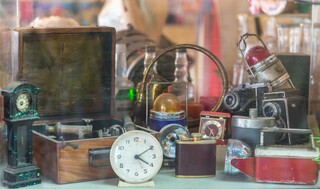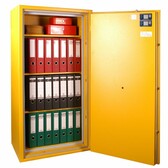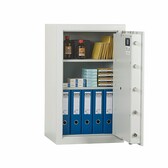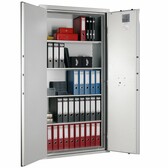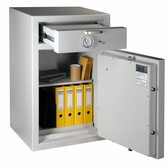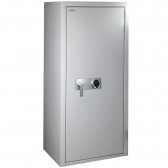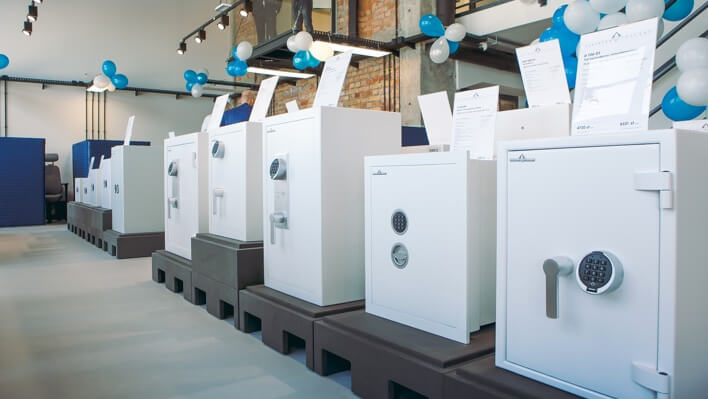There are some industries where, despite the increasing development of digital technology, the circulation of money in cash is perfectly fine and irreplaceable. Breaking into a pawn shop or an exchange office happens from time to time and whenever successful, the burglars' loot is spectacular.
Today we will look at safes that are used in two types of business that are not directly related to each other, but have a common denominator – the security of objects and money of really high values.
Pawnshop
A pawnshop is a business that lends against the pledge of movable property. The items given to pawnbrokers are called pledges. The pawnbroker will assess the value of a pledge and lend a percentage of its value. The loan is usually repaid in instalments , but can also be repaid in a single payment. If the loan is not repaid, the pawnbroker can repossess the lien.
Pawnshops have existed for centuries and were traditionally used by poor people to borrow money. In recent years, pawn shops have become more popular with people from all milieus because they offer a quick and easy way to borrow money.
It is therefore inevitable that a pawnbroker's shop is a place where valuable items happen to be stored every day, the value of which can amount to several hundred thousand, or even several million zlotys. The money needs to be secured, because pawnshops are places more vulnerable to burglary than shops in shopping malls or even houses.
Exchange office
An exchange office is an institution that allows the conversion of currencies into other currencies. Although this is a basic definition, it is very likely that it is not sufficient and does not dispel all doubts. Bureaux de change play an important role in the process of converting one currency into another.
They are places where currency can be exchanged. The person visiting the exchange office provides cash and the cashier performs the exchange, for example into foreign currency. The exchange can be for different currencies, for example euros to dollars or zloty to pounds. For larger sums, it is possible to negotiate the exchange rate. The exchange at the bureau de change is a hassle-free and secure operation.
Despite the increasing popularity of online exchange offices where the exchange takes place digitally, the situation with physical bureaux de change is even worse than with pawnbrokers, because these are places where money in cash is kept continuously and in really large amounts. It is imperative to keep cash in a safe that has the appropriate level of burglary resistance.
How much cash should I keep in the safe?
Since the basis of the operation of both a pawnshop and an exchange office is the presence of cash and valuables on site, the first question you need to answer is: What security class of safe should you choose?
Legal basis
Surprisingly, the state comes to our rescue here by regulating the limits of monetary values that can be stored in safes. There is a Decree of the Minister of Internal Affairs and Administration of 7.09.2010, which sets out these limits in the form of a table using a so-called calculation unit. What is this? The calculation unit is 120 times the average monthly salary for the previous quarter, as announced by the Central Statistical Office. It is a sliding value, e.g.: in the case of a safe in class V according to EN 1143-1 in March 2019, you could securely and legally store cash values amounting to PLN 4,957,440 in the safe.
Insurance
The above regulations do not directly apply to insuring the contents of a safe. If the value of what you intend to keep inside will represent an exceptionally large sum, it would be a good idea to contact your insurer and assess the risk. Since insuring the contents of a safe against burglary is a very individual matter in Poland, the agent will take a mass of factors into account, not just factors such as the class of the safe.
What kind of money safe to buy?
Focusing on the industries discussed at the beginning, we assume that you will be interested in a safe for money or items of very high value. In that case, it is clear that you want to buy a top-quality safe in which you can hide everything you need for peace of mind.
What class of safe will be suitable?
A money safe or any other type of device designed to store valuable items, is defined according to burglary classes. Security levels, i.e. classes I to V, are certified on the basis of the European standard EN 1143-1, and issued by institutions that assess the technological capabilities of the equipment through tests, such as the VdS (German: Verband der Sachversicherer – association of property insurers), ECB-S (European Certification Body) or the Institute of Precision Mechanics.
The higher the class of the safe, the greater the level of security, so it is worth investing in the best possible safes to have the utmost certainty.
While models in class I, sometimes class II, are usually sufficient for use in homes and offices, for a pawnbroker's shop or an exchange office we recommend a wide range of more serious models – in classes III-V.
You can find details of the safety classes of safes here.
What size of money safe should I choose?
When choosing a money safe, it is worth to remember one thing – even a device of the highest security grade is not 100% burglary-proof. You can get into any safe as long as you have enough time. It is therefore crucial that the safe cannot be lifted.
The solution to this dilemma is the weight of the safe and the correct installation. While small safes, furniture safes, wall safes or other lightweight variations on the theme of single-wall armoured cabinets are typically home safes, in our case today a heavier type of device is required, as I mentioned a moment ago.
The second issue is space requirement. Thinking in terms of a multi-year investment, you will be keeping a lot of things in the safe, so the final size of the safe will depend primarily on how many of all these items you will be storing. Remember, a money safe is not a locker or another mini safe for your home, but a working tool that you will buy to protect your money and valuables from theft.
Which lock should I choose for a money safe?
The type of lock does not directly affect the level of security of the safe, but has a fundamental impact on the comfort of use.
How is a key lock used?
Key locks are standard equipment in most safes. Their use is intuitive for everyone and the cost of the lock itself is usually included in the price of the safe as an integral component. However, despite appearances, the advantages of this solution end at the price; such locks can cause more trouble than we think. The lock has a hole, which is a critical point. More than once, our service has been called to a lock where unruly toddlers have forced chewing gum into the hole. The key to high-quality safes is also a rather bulky object – at several centimetres in length, it is closer to a bladed weapon than to the keys with which we lock our doors. And what if the key is lost or stolen? Two are supplied with each safe as standard. There are no digital key templates, so if one is lost, the other must be sent back for service. The process is costly and lengthy. There is only one argument in favour of the key lock – the lowest price.
How does a mechanical combination lock work?
Mechanical combination locks have a number of features that make them loyal supporters, especially among customers who shy away from electronics. They are opened with a dial which is set in motion, so the lock needs neither power nor maintenance. In fact, the simple mechanism is difficult to fool, and it takes a lot of effort to break the lock. Opening a safe secured in this way has its own relish, is rewarding, but requires patience and precision. The choice you make depends on how you want to use the safe. If the idea is to look into the safe quietly, unhurriedly and not too often, then this is the right lock for you. However, if the safe accompanies you at work and you open it several times a day in a hurry, then definitely choose an electronic lock.
What are the advantages of an electronic lock?
The lock that the vast majority of customers choose, because of its quickness and ease of use, is the electronic lock. There are many models of this type of lock supplied by reputable manufacturers. The most interesting features are the number of programmable users, the options for reading operations, the method of changing batteries or the four-eye mode, i.e. opening the lock with two separate codes. Some locks also have a key revision, i.e. a physical key for emergency opening. This function can be very helpful, but remember to keep the key away from the safe and, if possible, preferably at a different address.
Electronic locks are very easy to handle, both at the programming stage and in use. All you have to do is enter a pre-defined code and pull the handle when you hear the appropriate sound to signal the lock release.
Each of the electronic locks we offer has the option of changing batteries. Some models have the battery hidden under the keypad, simply lever it up with your thumb to replace the battery with a new one in a matter of moments. Others have the battery slot hidden inside the door, in which case there are terminals in a suitable place under the keypad where a new 9 V battery must be inserted. In this way, by powering up the lock in an emergency, the safe is opened and the batteries replaced. A money safe with an electronic lock is the best choice.
Fireproof safes
If the ultimate goal of your safes is to protect your money, possibly you will be storing documents or flammable items there, it is a good idea to consider safes that have fire resistance.
Fireproof safes for money or valuables are a more versatile piece of equipment, protecting the contents not only in the case of a break-in, but even a prolonged fire. Restrictive tests check the structure's fire resistance from 30 to 120 minutes. Note, however, that the maximum level of burglary resistance for fireproof safes is class II according to EN 1143-1.
Assembly
As I mentioned earlier, the correct assembly of a safe is one of the key conditions for ensuring the security of money and valuables.
According to European standard EN 1143-1, mounting to the floor or wall is necessary for any safe weighing less than 1,000 kg. Can such a safe end up in a pawnshop or bureau de change? Absolutely. For example, a class V safe that is only 1.4 m high can weigh over a tonne.
When thinking of buying a safe, you need to choose places where a safe weighing several hundred kilos can be safely placed and anchored. Eliminate those where water, electricity and gas lines run. If the entire floor space does not meet these requirements, the safe can be anchored by drilling holes in the wall.
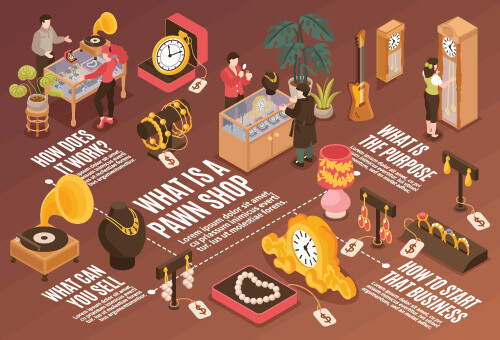
Summary
Businesses such as exchange offices and pawn shops need top-quality safes, where the lowest regular price is not the deciding factor. While in a shop or hotel we can go for a lightweight built-in home safe with a basic lock, here we want a device that provides security and burglary resistance at the highest possible level.
You will therefore be interested in high-grade and heavy models. The choice is large, and there are many issues to be aware of. In all cases, please do not hesitate to contact our Sales Department, who will be happy to answer any questions you may have.
